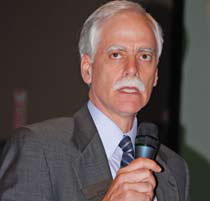AVMA Town Hall covers wealth of veterinary topics
Veterinary education standards, diversity, and membership engagement—no topic was off-limits at the inaugural AVMA Town Hall Meeting, July 11 during the AVMA Annual Convention in Seattle.
About 65 attended the meeting to voice their opinions, ask questions, and listen to the discussion. AVMA staff, Executive Board members, and representatives from allied organizations were on hand to provide their expertise.


One topic given to lengthy discussion was the extent to which veterinary students feel prepared to perform clinical procedures after graduation.
One speaker noted that students today do not have as much hands-on experience during veterinary school as students once did, and, therefore, resort more often to low-paying internships to make up for it.
Mary Hes, a student at the University of Tennessee College of Veterinary Medicine who is a member of the Student AVMA Education and Licensure Committee, said in her position, she often hears students express excitement about beginning to practice veterinary medicine, but fear because they have so little experience.
"I would love to see the AVMA and (Association of American Veterinary Medical Colleges) develop a determined route for students to have programs for mentorship and internships so we don't have to take salary cuts to get the experience we need to be developed in the future," Hes said.
Dr. W. Ron DeHaven, AVMA CEO, mentioned that the Executive Board recently approved a new Task Force on Veterinary Internships in conjunction with the AAVMC. The objective of the task force will be to review the status and overall quality of veterinary internships, which are currently not subject to oversight.
Diversity was another topic broached when Dr. Gail R. Hansen, AVMA Congressional Science Fellow, asked what the AVMA is doing to make the profession look more like the rest of the U.S. population.
Dr. DeHaven acknowledged that the Association needs to address issues related to gender, generational, and ethnic diversity in organized veterinary medicine. He also noted that each of these is a distinct aspect of diversity requiring its own response.
One of the AVMA's efforts in this regard came when the Task Force on Future Roles and Expectations made several recommendations to reduce the time requirements for those serving in voluntary leadership positions in the AVMA. The Executive Board and House of Delegates have since adopted those recommendations, including changing the length of council (except for the Council on Education) positions from six years to three.
Dr. David E. Granstrom, director of the AVMA Education and Research Division, added that the AVMA has formed a working group to examine the report of the Task Force on Diversity, issued in 2006. The group will look at how the task force's recommendations can be incorporated into the Association's strategic plan.
In the broader realm of the profession, Dr. Marguerite Pappaioanou, AAVMC executive director, said the most important recruiters are practitioners themselves.
"Any one of you who sees the public, who sees clients—especially of color—(can) get their kids to start thinking of veterinary medicine as a career. That's something we can all do," she said.
Dr. Woodrow J. Allen of Carson City, Nev., inquired about how the AVMA is engaging veterinarians in their late 20s and 30s to keep them involved in organized veterinary medicine.
"We tend to lose members in the middle years, when family responsibilities take over," Dr. Allen said. "We need more help to see how we can keep these people involved even after being new graduates."
Dr. DeHaven agreed, noting that members are most likely to drop their membership between three and seven years after graduation.
"There's a lot of loyalty to the profession, but when in the formative years—they're building a practice and family—they don't have time for volunteer activities," Dr. DeHaven said.
Dr. Kevin Dajka, director of the AVMA Membership and Field Services Division, said the AVMA also tends to lose contact with that cohort as they move and switch jobs. He mentioned that the Association now has an online directory of current members, and members should have an easier time updating their information.
"So if we get the word out, we can be in better contact with them to identify their wants and needs and be able to better serve them," Dr. Dajka said.
On another topic, Dr. David R. Barnett of Burlingame, Calif., had a question about the sometimes "scratchy" relationship the AVMA has with humane organizations such as the People for the Ethical Treatment of Animals.
"What overture is the AVMA making to communicate and cooperate with organizations with which we can communicate?" asked Dr. Barnett, a former AVMA president.
Dr. Gail C. Golab, director of the AVMA Animal Welfare Division, responded that basically the AVMA talks to all organizations.
"That's how we find out the questions that are out there and the attitudes. When we talk, we expect a conversation, not a one-way dialogue," Dr. Golab said.
With that, the AVMA would like other parties to bring data with them to back up their stances and allow the Association to give their perspective serious consideration, she said.
Reflecting on participation in this year's town hall meeting, Dr. DeHaven said, "Based on our numbers, we didn't do as good of a job as we could have." That was largely because of scheduling conflicts that caused the time of the meeting to change before the convention.
Another town hall meeting is anticipated for next year's AVMA convention in Atlanta.